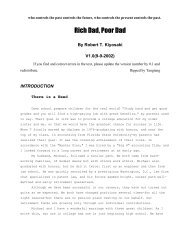Rich Dad, Poor Dad
You also want an ePaper? Increase the reach of your titles
YUMPU automatically turns print PDFs into web optimized ePapers that Google loves.
who controls the past controls the future, who controls the present controls the past.<br />
Once you have decided to concentrate on minding your own business, how do<br />
you set your goals? For most people, they must keep their profession and rely<br />
on their wages to fund their acquisition of assets.<br />
As their assets grow, how do they measure the extent of their success?<br />
When does someone realize that they are rich, that they have wealth? As well as<br />
having my own definitions for assets and liabilities, I also have my own<br />
definition for wealth. Actually I borrowed it from a man named Buckminster<br />
Fuller. Some call him a quack, and others call him a living genius. Years ago<br />
he got all the architects buzzing because he applied for a patent in 1961 for<br />
something called a geodesic dome. But in the application, Fuller also said<br />
something about wealth. It was pretty confusing at first, but after reading it<br />
for awhile, it began to make some sense: Wealth is a person's ability to survive<br />
so many number of days forward... or if I stopped working today, how long could<br />
I survive?<br />
Unlike net worth-the difference between your assets and liabilities, which<br />
is often filled with a person's expensive junk and opinions of what things are<br />
worth-this definition creates the possibility for developing a truly accurate<br />
measurement. I could now measure and really know where I was in terms of my<br />
goal to become financially independent.<br />
Although net worth often includes these non-cash-producing assets, like<br />
stuff you bought that now sits in your garage, wealth measures how much money<br />
your money is making and, therefore, your financial survivability.<br />
Wealth is the measure of the cash flow from the asset column compared with<br />
the expense column.<br />
Let's use an example. Let's say I have cash flow from my asset column of<br />
S"J,000 a month. And I have monthly expenses of 52,000. What is my wealth?<br />
Let's go back to Buckminster Fuller's definition. Using his definition,<br />
how many days forward can I survive? And let's assume a 30-day month. By that<br />
definition, I have enough cash flow for half a month.<br />
When I have achieved $2,000 a month cash flow from my assets, then I will<br />
be wealthy.<br />
So I am not yet rich, but I am wealthy. I now have income generated from<br />
assets each month that fully cover my monthly expenses. If I want to increase my<br />
expenses, I first must increase my cash flow from assets to maintain this level<br />
of wealth. Take notice that it is at this point that I no longer am dependent on<br />
my wages. I have focused on and been successful in building an asset column<br />
that has made me financially independent. If I quit my job today, I would be<br />
able to cover my monthly expenses with the cash flow from my assets.




